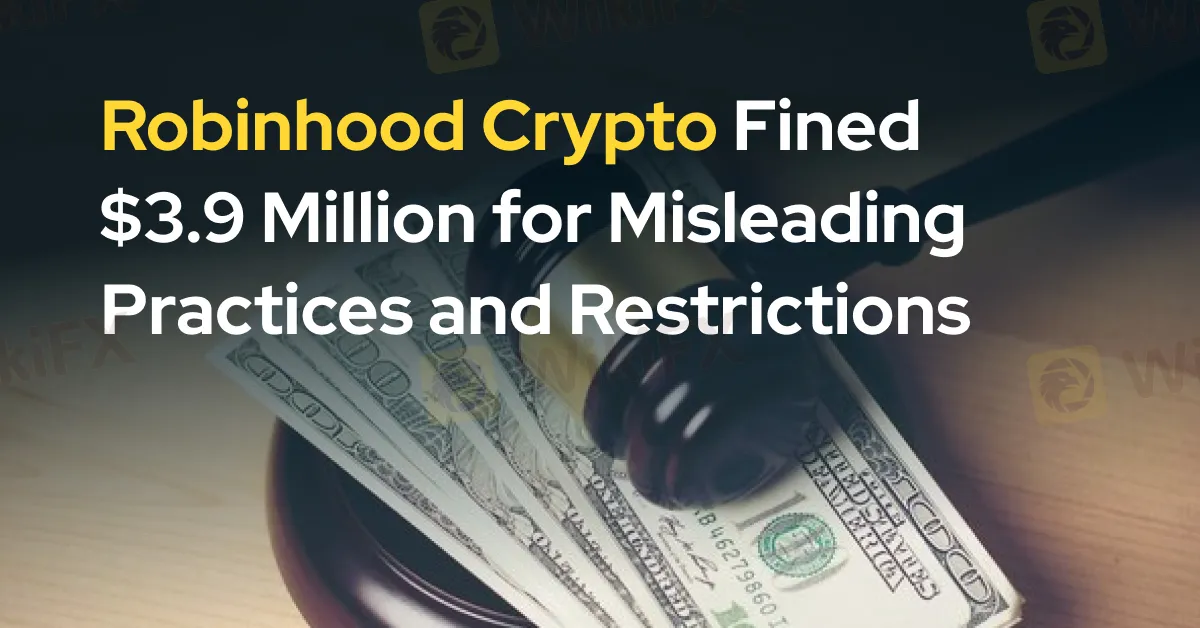简体中文
繁體中文
English
Pусский
日本語
ภาษาไทย
Tiếng Việt
Bahasa Indonesia
Español
हिन्दी
Filippiiniläinen
Français
Deutsch
Português
Türkçe
한국어
العربية
Robinhood Crypto Fined $3.9 Million for Misleading Practices and Restrictions
Abstract:California Attorney General Rob Bonta recently announced a $3.9 million settlement with Robinhood Crypto, LLC, following an investigation into the company's practices. The settlement addressed Robinhood's failure to allow customers to withdraw their cryptocurrency from their accounts between 2018 and 2022, as well as its incomplete disclosures regarding trading and order handling arrangements.

California Attorney General Rob Bonta recently announced a $3.9 million settlement with Robinhood Crypto, LLC, following an investigation into the company's practices. The settlement addressed Robinhood's failure to allow customers to withdraw their cryptocurrency from their accounts between 2018 and 2022, as well as its incomplete disclosures regarding trading and order handling arrangements. This resolution, which includes a significant penalty and specific conduct requirements, stems from violations of the California Commodities Law (CCL).
According to the findings of the California Department of Justice, Robinhood had been selling commodities contracts in violation of the CCL. Customers were led to believe they were purchasing cryptocurrencies with the option to withdraw their assets later. However, Robinhood did not actually deliver these digital assets to customers, forcing them to sell their holdings back to Robinhood to exit the platform. As a result, the platform prevented investors from withdrawing their cryptocurrency, contrary to what had been implied.

Additionally, Robinhood misrepresented its trading practices. The platform had advertised that it would connect to multiple trading venues to secure competitive prices for its customers. However, this was not consistently the case. Robinhood also reassured users that it held all their cryptocurrencies, but it did not disclose that in certain instances, trading venues held customer assets for extended periods. These discrepancies formed part of the basis for the investigation, which was initiated after a series of consumer complaints.
The settlement requires Robinhood to permit customers to withdraw their cryptocurrency assets to personal wallets, a key issue raised in the investigation. It also mandates that Robinhood ensure its representations regarding trading and order handling practices are accurate and in line with reality. This includes clarifying the routing of orders to trading venues and the handling of cryptocurrency purchase and sale prices.
Furthermore, Robinhood is required to update its customer agreement to disclose potential delays in settlements with trading venues, particularly in the event of a security concern within the cryptocurrency network. The company must also notify the Attorney Generals office of any incidents leading to a settlement delay of more than a week.
Attorney General Bonta emphasized that Californias strong consumer protection laws apply to all companies, including those operating in the cryptocurrency industry. He reiterated that the settlement should serve as a message that companies, regardless of their industry, must adhere to state laws designed to protect consumers and investors. Robinhood's case demonstrates the necessity for transparency and accountability in the evolving digital financial landscape.
Cryptocurrency, as a form of digital investment, has gained widespread popularity in recent years. However, as Bonta pointed out, the market is highly volatile, and there are no government guarantees or insurance for crypto assets, underscoring the importance of consumer protection in this emerging sector.

Disclaimer:
The views in this article only represent the author's personal views, and do not constitute investment advice on this platform. This platform does not guarantee the accuracy, completeness and timeliness of the information in the article, and will not be liable for any loss caused by the use of or reliance on the information in the article.
Read more

Top 9 Financial Fraud Cases in Recent History
Know the top 9 financial fraud cases in history, from Enron to FTX, uncovering deception and greed. Learn how WikiFX protects investors from scams and fraud.

KuCoin Pay Introduces Easy Crypto Payments for Merchants
How KuCoin Pay, an innovative PoS system enabling merchants to accept 54 cryptocurrencies, including Bitcoin, Ethereum, and USDT, for seamless transactions.

FTX Chapter 11 Restructuring Plan Activated: $16 Billion to Be Distributed
The highly anticipated FTX Chapter 11 bankruptcy restructuring plan officially comes into effect today, marking a critical step forward for the cryptocurrency exchange in recovering from its collapse. A $16 billion recovery fund begins distribution today, offering hope to creditors worldwide.

PH SEC Issues Crypto Guidelines for Crypto-Asset Service Providers
The SEC unveils draft guidelines for crypto-asset services in the Philippines, strengthening licensing, compliance, and investor protection for 2025 and beyond.
WikiFX Broker
Latest News
Will Gold Break $2,625 Amid Fed Caution and Geopolitical Risks?
ECB Targets 2% Inflation as Medium-Term Goal
New Year, New Surge: Will Oil Prices Keep Rising?
PH SEC Issues Crypto Guidelines for Crypto-Asset Service Providers
FTX Chapter 11 Restructuring Plan Activated: $16 Billion to Be Distributed
Bithumb CEO Jailed and Fined Over Bribery Scheme in Token Listing Process
WikiFX Review: Something You Need to Know About Saxo
Is PGM Broker Reliable? Full Review
Terraform Labs Co-founder Do Kwon Extradited to the U.S. to Face Fraud Charges
Has the Yen Lost Its Safe-Haven Status?
Currency Calculator






